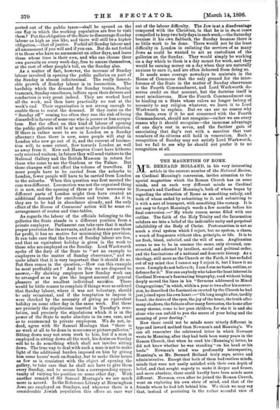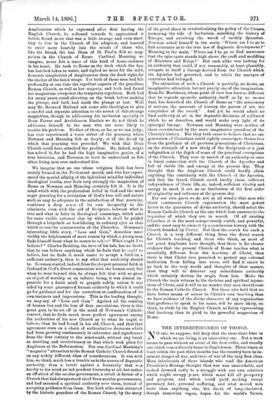THE MAGNETISM OF ROME.
MR. BERNARD HOLLAND, in his very interesting article in the current number of the National Review, on Cardinal Manning's conversion, invites attention to the special magnetism which the Roman Church has on some minds, and on such very different minds as Cardinal Newman's and Cardinal Manning's, both of whom began by regarding the attraction of Rome as something unholy, and both of whom ended by submitting to it, and submitting to it with a sort of transport, with something like ecstacy. It is not easy to forget Manning's words a few months before his final conversion :—" My whole reason seems filled with one outline. The faith of the Holy Trinity and the Incarnation subdues me into a belief of the indivisible unity and perpetual infallibility of the Body of Christ. Protestantism is not so much a rival system which I reject, but no system, a chaos, a wreck of fragments without idea, principle, or life. It is to me flesh, blood, unbelief, and the will of man. Anglicanism seems to me to be in essence the same, only elevated, con- structed, and adorned by intellect, social and political order, and the fascinations of a national and domestic history. As a theology, still more as the Church or the Faith, it has so faded out of my mind that I cannot say I reject it, but I know it no more. I simply do not believe it; I can form no basis, outline, or defence for it." Nor can anybody who takes the least interest in Cardinal Newman's fascinating biography, read without being deeply moved the lines in his "Sermons addressed to Mixed Congregations," in which, within a year or two after his conver- sion, he described the fascination exerted by the Church he had just joined upon his own heart:—" Oh long sought after, tardily found, the desire of the eyes, the joy of the heart, the truth after many shadows, the fulness after many foretastes, the home after many storms, come to her poor children, for she it is and she alone who can unfold to you the secret of your being and the meaning of your destiny."
Now there could not be minds more utterly different in type and inward method than Newman's and Manning's. We can all remember the celebrated letter in which Newman wrote to Manning, after they had both been many years in the Roman Church, that when he read his (Manning's) letter, he did not know whether he was standing "on his head or his heels." Newman's mind was profoundly introspective, Manning's, as Mr. Bernard Holland truly says, active and administrative. Except that both of them had restless minds, minds that were not easily satisfied with their own depth of belief, and that sought eagerly to make it deeper and firmer, and more absolute, there could hardly have been minds more different. Newman, even after he joined the Roman Church, went on exploring his own state of mind, and that of the friends whom he had left behind him. We think we may say that, instead of persisting in the rather scornful view of Anglicanism which he expressed after first leaving the English Church, he softened towards it, appreciated it better, found more that was a little strange and even start- ling to him in the Church of his adoption, and learned to enter more heartily into the minds of those who, like his friend, the late Dean of St. Paul's, felt no mag- netism in the Church of Rome. Cardinal Manning, we imagine, never felt a trace of this kind of home-sickness in his heart. He took to Rome as the duck which the hen has hatched takes to water, and sighed no more for the mild, domestic simplicities of Anglicanism than the duck sighs for the shelter of the hen's wings. Yet both of these men had felt profoundly at one time the repellent aspects of the grandiose Roman Church, as well as her majesty, and both had found her magnetism overpower the temporary repulsion. Both had for many years stood shivering on the brink before making the plunge, and both had made the plunge at last. Well may Mr. Bernard Holland ask some able theologian to give a careful and separate attention to the secret of this strange magnetism, though in addressing his invitation specially to Dean Farrar and Archdeacon Sinclair we do not think he addresses himself to the men who are most likely to resolve his problem. Neither of them, so far as we can judge, has ever experienced a trace either of the yearning which Newman and Manning felt so deeply, or of the dread by which that yearning was preceded. We wish that Dean Church could have attacked the problem. He, indeed, might has solved it, for he had the high imaginative genius of a true historian, and Newman at least he understood as few other living men ever understood him.
We imagine that no one whose religious faith has been mainly formed in the Protestant mould, and who has experi- enced the special affinity of the individual mind for individual theological truths, ever feels very strongly the magnetism of Rome as Newman and Manning certainly felt it. It is the mind which with the profoundest belief in God and the most eager yearning for a revelation of God's true will and nature such as may be adequate to the satisfaction of that yearning, combines a deep sense of its own incapacity to dis- criminate, even with the aid of Scripture, between what is true and what is false in theological reasonings, which asks for some 17 isible external clue by which it shall be guided through a labyrinth so bewildering to ordinary eyes as that which co7ers the controversies of the Churches. Newman's interesting little story, "Loss and Gain," describes most vividly the helplessness of mere reason by which a young man finds himself beset when he comes to ask,—" What ought I to believe P " Charles Redding, the hero of his tale, has no doubt that he can believe anything which he feels that he ought to believe, but he finds it much easier to accept a faith on a sufficient authority, than to say what that authority should be. Newman started, indeed, from the deepest personal faith in God and in God's direct communion with the human soul, but when he went beyond this, he always felt that with so great an object of worship as an infinite being, it was almost im- possible for a finite mind to grapple safely, unless it was aided by some guaranteed human authority to which it could go for guidance and for the correction or confirmation of its own instincts and impressions. This is the leading thought, we may say, of "Loss and Gain." Against all the rending of human ties and the loss of dear associations, there is this great gain to be set off in the mind of Newman's Catholic convert, that he finds much more perfect agreement among the authorities of his new Church as to what he ought to believe, than he had found in his old Church, and that that agreement rests on a chain of authoritative decisions which had been growing continuously in coherence and significance from the first century to the nineteenth, without any break so startling and revolutionary as that which took place for Anglicans at the Reformation. Nor was Cardinal Manning's " magnetic " attraction to the Roman Catholic Church founded on any widely different class of considerations. It was with him, we think, much less a trouble as to the source of dogmatic authority, than a revolt against a hierarchy that was hardly to his mind an independent hierarchy at all, but rather an off-shoot of the secular government, a revolt in favour of a Church that had always stood aloof from secular governments, and had assumed a spiritual authority over them, instead of accepting guidance from them. But both alike were attracted by the historic grandeur of the Roman Church, by the story of its great share in revolutionising the policy of the Caesars, stemming the tide of barbarism, moulding the history of Europe, and surviving the wreck of earthly dynasties. Newman asked himself in the main, 'Where am I to go to find assurance as to the true law of dogmatic development?' Manning in the main, 'Where am I to go to find assurance that the episcopate stands high above the craft and meddling of Ministers and Kings ?' But each alike was looking for an authority that could, if not reasonably, at least plausibly, arrogate to itself a lineage derived from the Church which the Apostles had governed, and to which the martyrs of centuries had belonged.
The attraction of such a Church is partially, no doubt, an imaginative attraction, but not purely one of the imagination. Even Dr. Martineau, whose point of view has been so different that he regards apostolic authority itself as by no means final, has described the Church of Rome as "the missionary of nations, the associate of history, the patron of art, the vanquisher of the sword." And yet he would admit no final authority at all in the dogmatic decisions of a Church which he so describes, and would make very light of its episcopal lineage. Newman and Manning were neither of them overwhelmed by the mere imaginative grandeur of the Church's history. But they both came to believe that no one generation of Cbristians could rightly emancipate themselves from the guidance of all previous generations of Christians, on the strength of a new study of the Scriptures or a just indignation at the depth of some of the practical corruptions of the Church. They were in search of an authority at once in lineal connection with the Church of the Apostles and full of visible life and energy at the present day. They thought that the Anglican Church could hardly claim anything like continuity with the Church of the Apostles, and that the Greek Church could hardly claim sufficient independence of State life, or, indeed, sufficient vitality and energy to mark it out as an institution of the first order of originality and influence at the present day.
For our own parts we do not at all wonder that men who think continuous Church organisation the most potent factor in the guarantee of divine authority, should select the Roman Catholic Church as the one which best answers to the requisites of which they are in search. Of all existing Churches it is the most conspicuously visible and powerful, and the most easy to connect by a continuous history with the Church founded by Christ. But then the search for such a Church is a very different thing from the direct search for Christ's teaching, and those who think, as most of our great Anglicans have thought, that there is far clearer evidence that the present Church of Rome teaches what is essentially different from the teaching of Christ, than there is that Christ ever promised to protect any external institution from falling into error, will find it easier to go back to the very words and thoughts of their master, than they will to discover any subordinate authority which certainly derives its origin from him. Make the Church the main witness to the doctrine and spiritual injunc- tions of Christ, and it will be no wonder that men should rush to the Roman Catholic Church. But those who hold that we have better means of access to Christ's own teaching than we have evidence of the divine character of any organisation that professes to speak in his name, will be more likely, we think, to abide by the English Church as fairly representing that teaching, than to yield to the powerful magnetism of Rome.







































 Previous page
Previous page